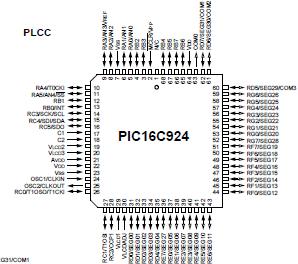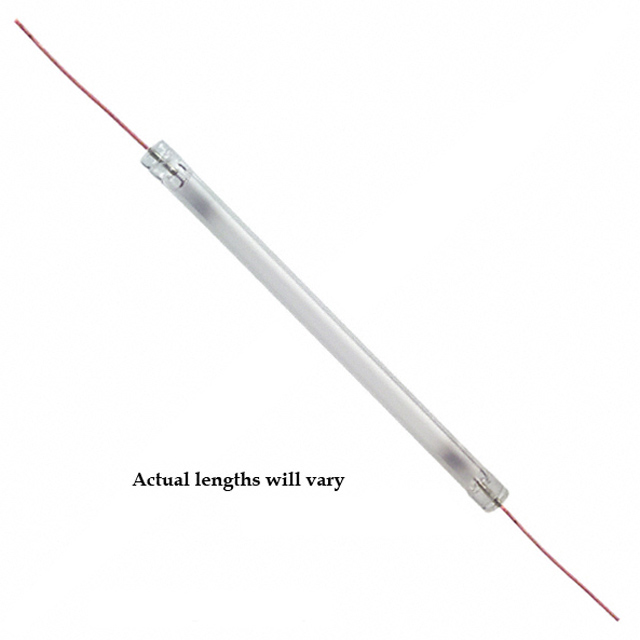Features: Microcontroller Core Features:
• High performance RISC CPU
• Only 35 single word instructions to learn
• 4K x 14 on-chip EPROM program memory
• 176 x 8 general purpose registers (SRAM)
• All single cycle instructions (500 ns) except for program branches which are two-cycle
• Operating speed: DC - 8 MHz clock input DC - 500 ns instruction cycle
• Interrupt capability
• Eight level deep hardware stack
• Direct, indirect and relative addressing modes
Peripheral Features:
• 25 I/O pins with individual direction control
• 25-27 input only pins
• Timer0: 8-bit timer/counter with 8-bit prescaler
• Timer1: 16-bit timer/counter, can be incremented during sleep via external crystal/clock
• Timer2: 8-bit timer/counter with 8-bit period register,prescaler and postscaler
• One pin that can be configured a capture input,PWM output, or compare output
- Capture is 16-bit, max. resolution 31.25 ns
- Compare is 16-bit, max. resolution 500 ns
- PWM max resolution is 10-bits.
Maximum PWM frequency @ 8-bit resolution= 32 kHz, @ 10-bit resolution = 8 kHz
• Programmable LCD timing module
- Multiple LCD timing sources available
- Can drive LCD panel while in Sleep mode
- Static, 1/2, 1/3, 1/4 multiplex
- Static drive and 1/3 bias capability
- 16 bytes of dedicated LCD RAM
- Up to 32 segments, up to 4 commons
• Synchronous Serial Port (SSP) with SPITMand I2CTM
• 8-bit multi-channel Analog to Digital converter (PIC16C924 only)
Special Microcontroller Features:
• Power-on Reset (POR)
• Power-up Timer (PWRT) and Oscillator Start-up Timer (OST)
• Watchdog Timer (WDT) with its own on-chip RC oscillator for reliable operation
• Programmable code-protection
• Power saving SLEEP mode
• Selectable oscillator options
• In-Circuit Serial Programming™ (via two pins)Pinout Specifications
Specifications
| Program Memory Type |
OTP |
| Program Memory (KB) |
7 |
| CPU Speed (MIPS) |
2 |
| RAM Bytes |
176 |
| Digital Communication Peripherals |
1-SSP(SPI/I2C) |
| Capture/Compare/PWM Peripherals |
1 CCP |
| Timers |
2 x 8-bit, 1 x 16-bit |
| ADC |
5 ch, 8-bit |
| Temperature Range (C) |
-40 to 85 |
| Operating Voltage Range (V) |
2.5 to 6 |
| Pin Count |
64 |
Ambient temperature .................................-55°C to +125°C
Storage temperature ................................. -65°C to +150°C
Voltage on any pin with respect to VSS (except VDD, MCLR, and RA4)........ -0.3V to (VDD + 0.3V)
Voltage on VDD with respect to VSS ................. -0.3V to +7.5V
Voltage on MCLR with respect to VSS..................... 0V to +14V
Voltage on RA4 with respect to Vss ....................... 0V to +14V
Total power dissipation (Note 1).......................................1.0W
Maximum current out of VSS pin ...................................300 mA
Maximum current into VDD pin ......................................250 mA
Input clamp current, IIK (VI < 0 or VI > VDD)...............± 20 mA
Output clamp current, IOK (VO < 0 or VO > VDD).........± 20 mA
Maximum output current sunk by any I/O pin ..................10 mA
Maximum output current sourced by any I/O pin..............10 mA
Maximum current sunk by all Ports combined .................200 mA
Maximum current sourced by all Ports combined...............200 mA
Note 1: Power dissipation is calculated as follows: PDIS = VDD x {IDD - IOH} + {(VDD - VOH) x IOH} +(VOl x IOL)
DescriptionA newer device PIC16C924 is available. Please consider PIC16C925.This powerful (500 nanosecond instruction execution) yet easy-to-program (only 35 single word instructions) CMOS OTP-based 8-bit microcontroller packs Microchip's powerful PIC? architecture into a 64- or 68-pin package. PIC16C924 features an integrated LCD driver module - capable of driving 32 segments and 4 commons for LCD display and 5 channels of 8-bit Analog-to-Digital converters. The synchronous serial port can be configured as either 3-wire Serial Peripheral Interface (SPI?) or the 2-wire Inter-Integrated Circuit (I2C?) bus. Easily adapted for handheld meters, thermostats, home security and power/gas/water meter products.
The PIC16C924 is a family of low-cost, high-performance,CMOS, fully-static, 8-bit microcontrollers with an integrated LCD Driver module, in the PIC16CXXX mid-range family.
All PICmicro™ microcontrollers employ an advanced RISC architecture. The PIC16C924 microcontroller family has enhanced core features, eight-level deep stack, and multiple internal and external interrupt sources.The separate instruction and data buses of the Harvard architecture allow a 14-bit wide instruction word with the separate 8-bit wide data. The two stage instruction pipeline allows all instructions to execute in a single cycle, except for program branches (which require two cycles). A total of 35 instructions (reduced instruction set) are available. Additionally, a large register set gives some of the architectural innovations used to achieve a very high performance.
PIC16C924 microcontrollers typically achieve a 2:1 code compression and a 4:1 speed improvement over other 8-bit microcontrollers in their class.The PIC16C923 devices have 176 bytes of RAM and 25 I/O pins. In addition several peripheral features are available including: three timer/counters, one Capture/Compare/PWM module, one serial port and one LCD module. The Synchronous Serial Port can be configured as either a 3-wire Serial Peripheral Interface (SPI) or the two-wire Inter-Integrated Circuit (I2C) bus.
The LCD module features programmable multiplex mode (static, 1/2, 1/3 and 1/4) and drive bias (static and 1/3). PIC16C924 is capable of driving up to 32 segments and up to 4 commons. It can also drive the LCD panel while in SLEEP mode.
The PIC16C924 devices have 176 bytes of RAM and 25 I/O pins. In addition several peripheral features are available including: three timer/counters, one Capture/Compare/PWM module, one serial port and one LCD module. The Synchronous Serial Port can be configured as either a 3-wire Serial Peripheral Interface (SPI) or the two-wire Inter-Integrated Circuit (I2C) bus.
The LCD module PIC16C924 features programmable multiplex mode (static, 1/2, 1/3 and 1/4) and drive bias (static and 1/3). It is capable of driving up to 32 segments and up to 4 commons. It can also drive the LCD panel while in SLEEP mode. The PIC16C924 also has an 5-channel high-speed 8-bit A/D. The 8-bit resolution is ideally suited for applications requiring low-cost analog interface,e.g. thermostat control, pressure sensing, and meters.
The PIC16C924 family has special features to reduce external components, thus reducing cost, enhancing system reliability and reducing power consumption.There are four oscillator options, of which the single pin RC oscillator provides a low-cost solution, the LP oscillator minimizes power consumption, XT is a standard crystal, and the HS is for High Speed crystals. The SLEEP (power-down) feature provides a power saving mode. The user can wake up the chip from SLEEP through several external and internal interrupts and reset(s).
A highly reliable Watchdog Timer with PIC16C924's own on-chip RC oscillator provides recovery in the event of a software lock-up.A UV erasable CERQUAD (compatible with PLCC) packaged version is ideal for code development while the cost-effective One-Time-Programmable (OTP) version is suitable for production in any volume.
The PIC16C924 family fits perfectly in applications ranging from handheld meters, thermostats, to home security products. The EPROM technology makes customization of application programs (LCD panels, calibration constants, sensor interfaces, etc.) extremely fast and convenient.The small footprint packages make this microcontroller series perfect for all applications with space limitations. Low cost, low power, high performance,ease of use and I/O flexibility make the PIC16C9XX very versatile even in areas where no microcontroller use has been considered before (e.g. timer functions, capture and compare, PWM functions and coprocessor applications).

 PIC16C924 Data Sheet
PIC16C924 Data Sheet








